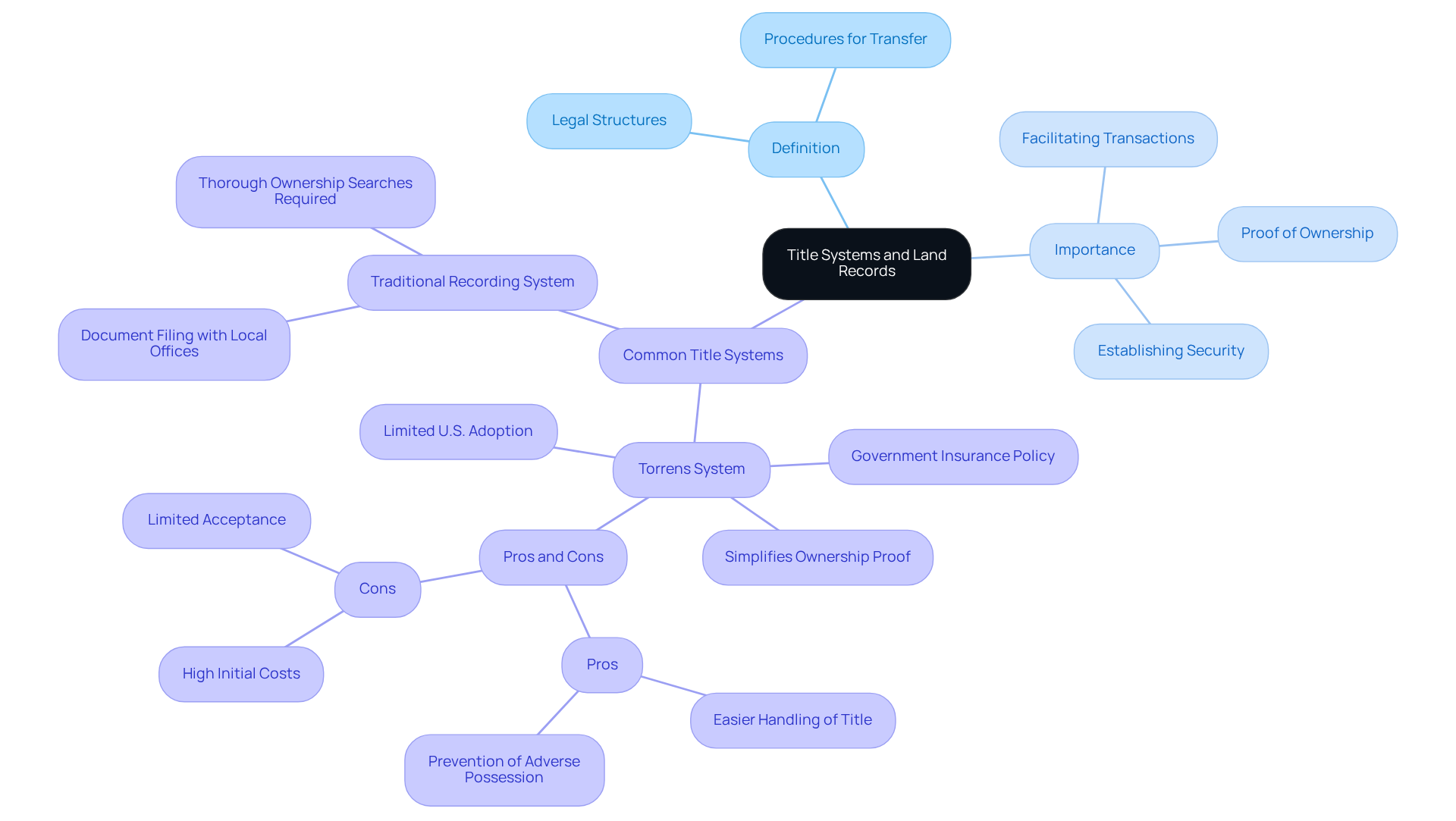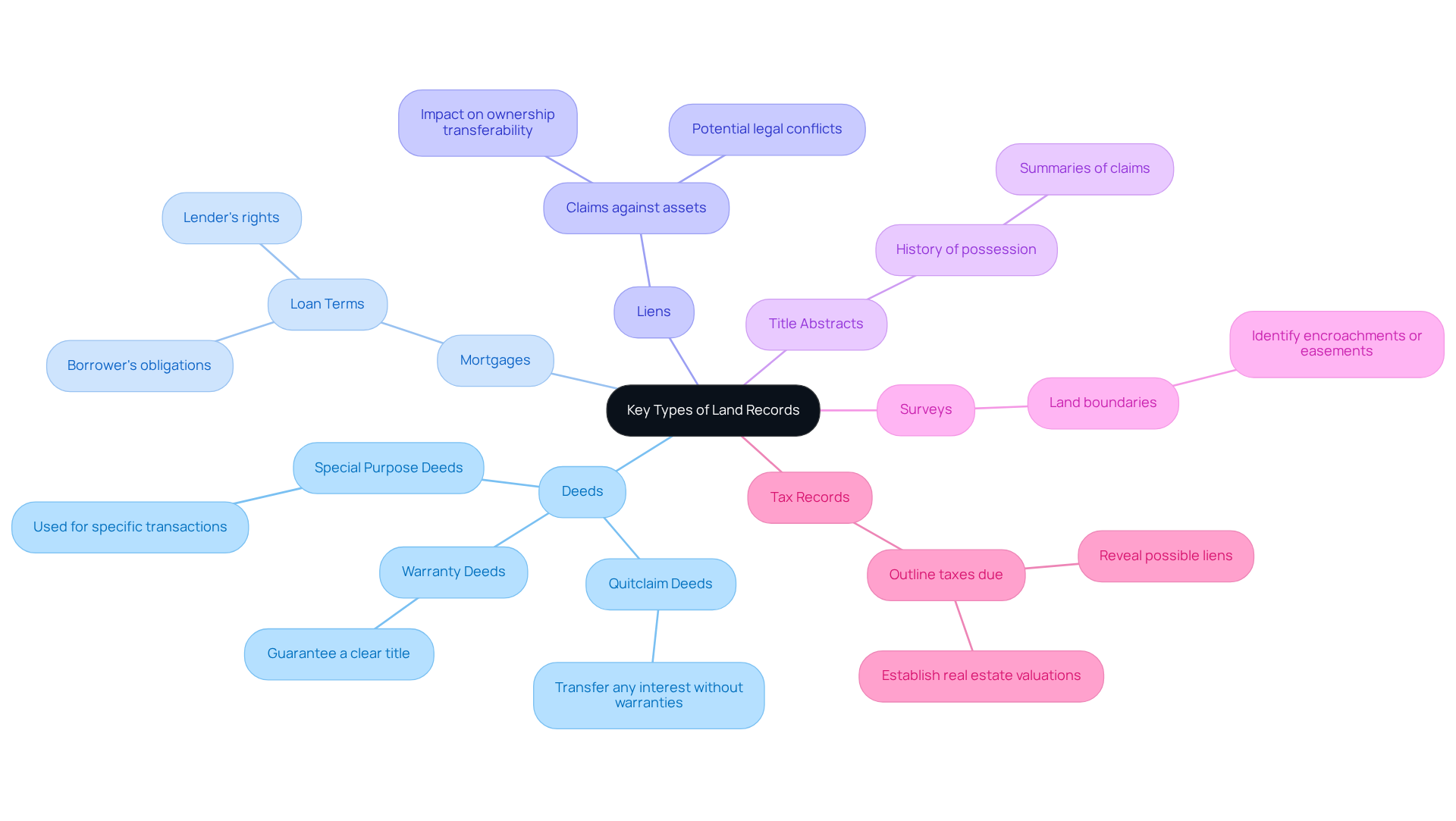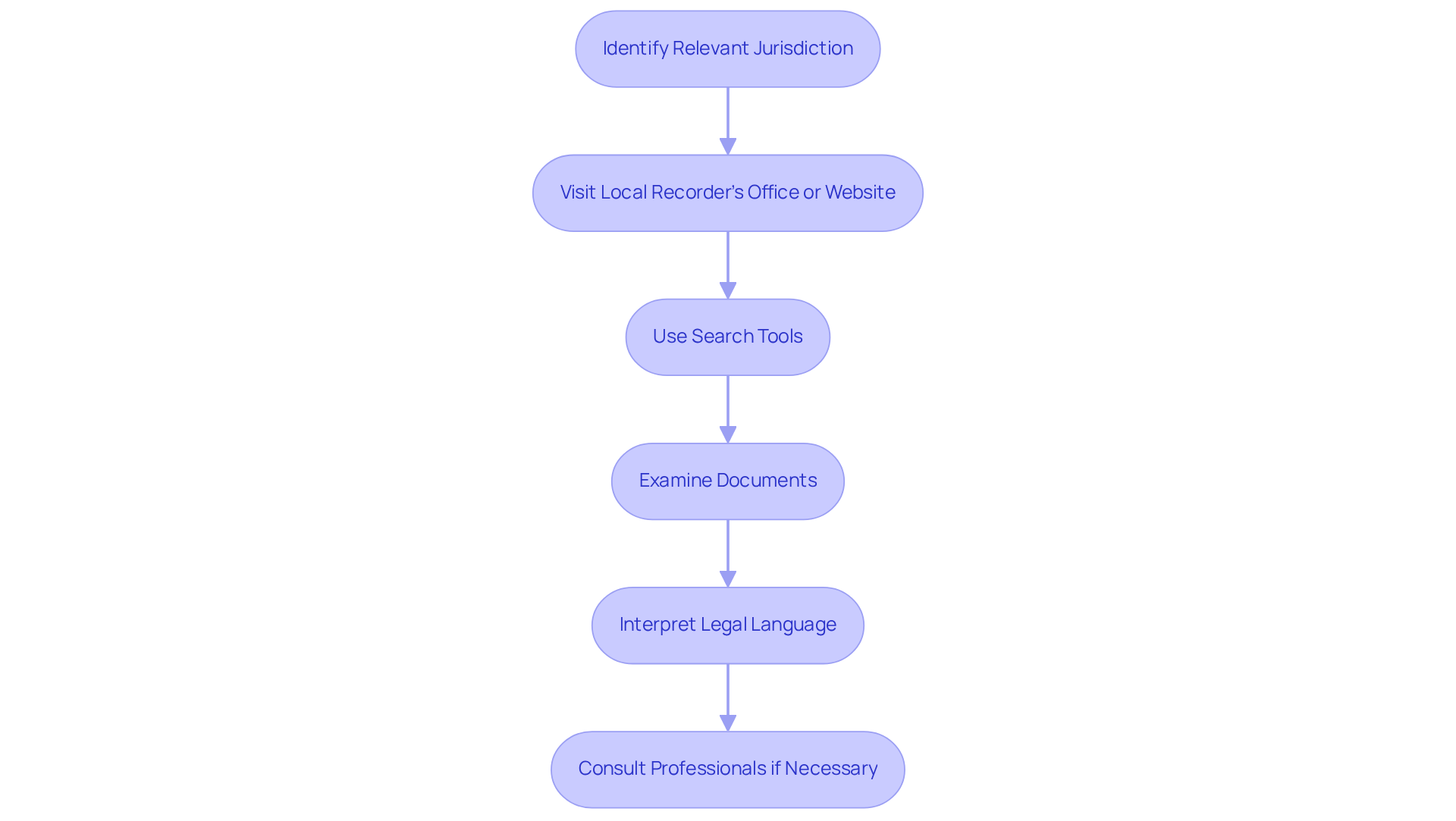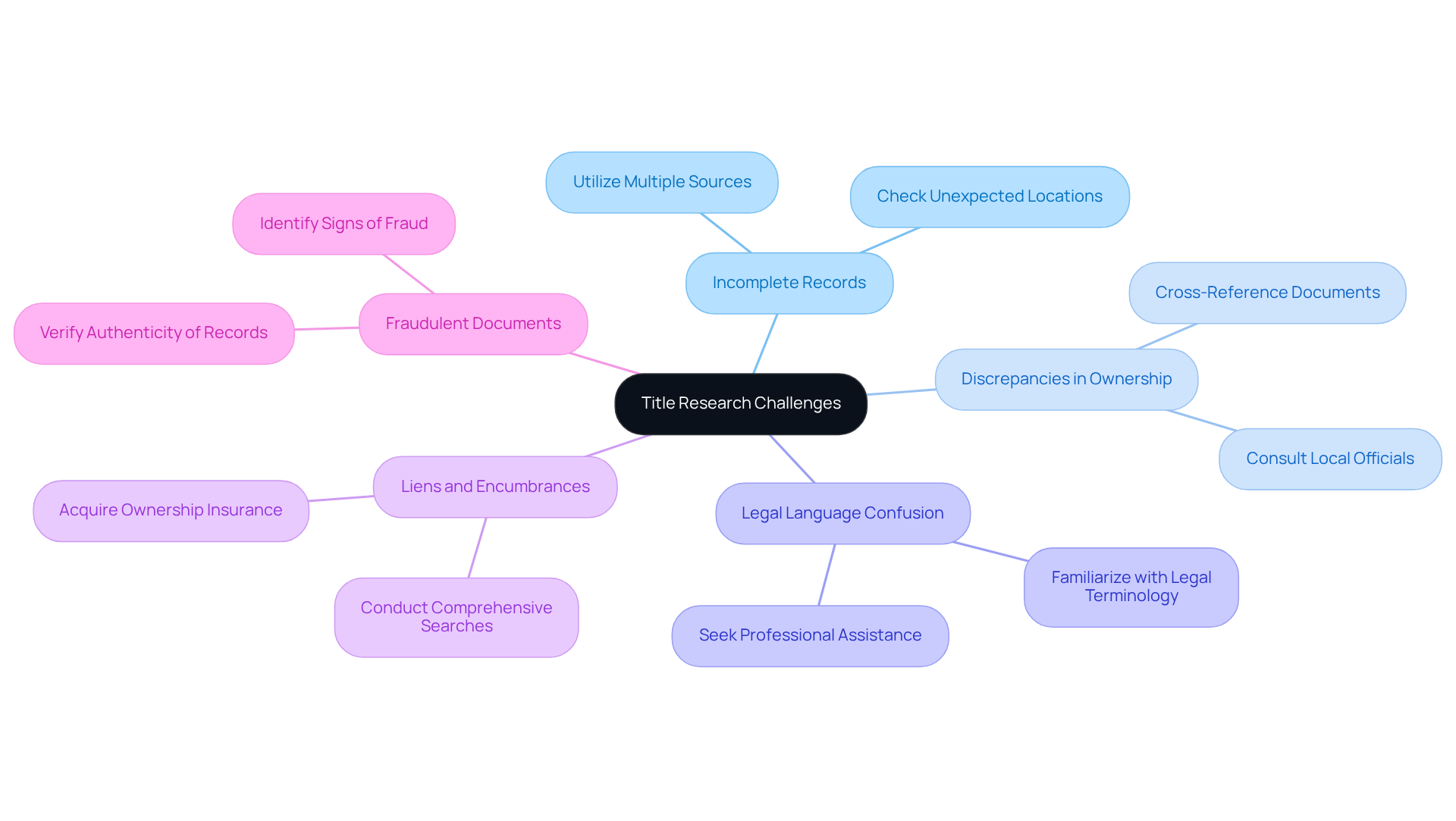Overview
The article underscores the critical connection between title systems and land records, highlighting their vital role in real estate transactions. It elucidates that title systems—such as the Torrens and traditional recording systems—establish the legal framework necessary for documenting ownership and facilitating property transfers. In parallel, land records, which include deeds and mortgages, act as indispensable proof of ownership and financial obligations. This interplay ensures the validity of property transactions, reinforcing the importance of accurate title research and the challenges that may arise in the process.
Introduction
Understanding the intricate relationship between title systems and land records is essential for anyone navigating the real estate landscape. Title systems serve as the backbone of property ownership and transfer, providing a framework that varies significantly across jurisdictions. This article explores the various types of land records, their critical importance in real estate transactions, and the challenges that arise in title research.
- How can one effectively access and interpret these vital documents to ensure a smooth transaction?
- What common pitfalls should be avoided?
Furthermore, we will delve into practical strategies for navigating these complexities.
Define Title Systems and Land Records
Title systems denote the legal structures and procedures that regulate the possession and transfer of real estate, illustrating how title systems relate to land records. These systems, which can differ by jurisdiction, typically encompass mechanisms for recording and verifying real estate rights, highlighting how title systems relate to land records. Land records serve as the official documents providing proof of real estate control, highlighting how title systems relate to land records, including deeds, mortgages, and liens. Understanding how title systems relate to land records is crucial for real estate experts, as this knowledge establishes the foundation for conducting ownership searches and ensuring that property transactions are legally valid.
In the United States, common title systems include:
- The Torrens system, which simplifies the process of proving ownership.
- The traditional recording system, where documents are filed with local government offices.
Each system possesses its own set of rules and procedures, consequently affecting how title systems relate to land records and how land documentation is maintained and accessed. Understanding these differences is essential for navigating the complexities of real estate transactions effectively.

Identify Key Types of Land Records
Key types of land records play a crucial role in real estate transactions and include:
-
Deeds: These legal documents facilitate the transfer of ownership between parties. Common types include warranty deeds, which guarantee a clear title; quitclaim deeds, which transfer any interest the grantor may have without warranties; and special purpose deeds, used for specific transactions.
-
Mortgages: These documents outline the terms of loans secured by real estate, detailing the borrower's obligations and the lender's rights. They are essential in real estate transactions, establishing the financial framework for acquiring land.
-
Liens: Claims against an asset for unpaid debts can significantly affect ownership transferability. Undisclosed liens may lead to extended legal conflicts and increased expenses, making it vital to identify them during ownership research.
-
Title Abstracts: Summaries of the history of possession and claims against a piece of real estate, title abstracts are fundamental in title searches, providing a comprehensive overview of potential issues that may impact possession.
-
Surveys: These maps delineate land boundaries and can uncover encroachments or easements, which are critical for understanding the complete scope of rights and responsibilities related to the land.
-
Tax Records: Documents outlining taxes due can reveal possible liens or title concerns. Accurate tax assessment information is essential for establishing real estate valuations and ensuring compliance with local regulations.
Understanding how title systems relate to land records is crucial for conducting thorough ownership research, as these documents ensure that all facets of ownership are accurately represented. In the U.S., an average of over 4 million deeds are filed annually, reflecting the volume of transactions and underscoring the necessity for precise title research. The interplay of actions, mortgages, and liens is significant; for instance, a mortgage can establish a lien on the asset, influencing its marketability and the purchaser's ability to secure financing. Flawed valuations can disrupt market balance and lead to price fluctuations, emphasizing the importance of accurate property assessments concerning these documents. Therefore, a comprehensive understanding of how title systems relate to land records is essential for title researchers who aim to mitigate risks and enhance transaction efficiency.

Access and Interpret Land Records
To access and interpret land records effectively, follow these essential steps:
- Identify the Relevant Jurisdiction: Determine which county or municipality holds the land documentation for the property in question. This is typically where the real estate is located.
- Visit the Local Recorder's Office or Website: Many jurisdictions provide online databases for searching property documents. If such resources are unavailable, a personal visit to the office may be necessary.
- Use Search Tools: Employ available search tools, including property address, owner name, or parcel identification number, to pinpoint the specific documents required.
- Examine the Documents: After locating the pertinent files, thoroughly review them for critical information such as ownership history, liens, and encumbrances. Pay close attention to the legal descriptions and any recorded easements.
- Interpret Legal Language: Acquaint yourself with common legal terms and phrases found in land documents. Understanding these terms will clarify the implications of the documents under review. As Jhonny Isakson remarked, "In the real estate business, you learn more about people and community issues, which is invaluable."
- Consult Professionals if Necessary: Should you encounter complex documents or challenging legal language, consider seeking assistance from a title company or real estate attorney.
By following these steps, you can proficiently access and interpret land documents, a crucial process for ensuring accurate ownership verification. Notably, the average time required to retrieve these documents can vary significantly among jurisdictions, often influenced by the efficiency of local systems and the availability of online resources. As highlighted in the 'Real Estate as the Path to Wealth' case study, mastering the interpretation of legal terminology in land documents is not merely beneficial but essential for successful property transactions.

Troubleshoot Common Title Research Challenges
Common challenges in title research are significant and warrant attention:
-
Incomplete Records: Missing or incomplete records can severely hinder the verification process. To mitigate this issue, researchers must utilize multiple sources, including online databases, local archives, and even unexpected locations such as retired trust officers' drawers, to gather comprehensive information.
-
Discrepancies in Ownership Information: Ownership inconsistencies are prevalent, with studies indicating that a substantial percentage of property research cases encounter conflicting information. To address these concerns, it is essential to cross-reference documents and consult local officials or property firms for clarification. As one research specialist aptly noted, "Navigating discrepancies requires diligence and a collaborative approach with local experts."
-
Legal Language Confusion: The complexity of legal documents can lead to misunderstandings. Researchers should familiarize themselves with common legal terminology or seek professional assistance to ensure accurate interpretation.
-
Liens and Encumbrances: Unresolved liens can complicate property transactions. Conducting comprehensive searches is crucial, and acquiring ownership insurance can provide an additional layer of security against potential claims.
-
Fraudulent Documents: Vigilance is paramount in identifying signs of fraud, such as forged signatures or altered documents. Researchers should verify the authenticity of records through official channels to safeguard against fraudulent activities.
By comprehensively understanding these challenges and employing effective troubleshooting strategies, title researchers can significantly enhance their efficiency and accuracy in verifying property ownership.

Conclusion
Understanding the connection between title systems and land records is essential for anyone involved in real estate transactions. Title systems serve as the backbone for managing property ownership and transfer, while land records provide the necessary documentation to substantiate these claims. Familiarizing oneself with these systems and records allows individuals to navigate the complexities of real estate with greater confidence and accuracy.
Key arguments throughout the article emphasize the importance of various types of land records, such as:
- Deeds
- Mortgages
- Liens
- Surveys
Each plays a critical role in ensuring the validity of property transactions. Accessing and interpreting these records correctly is fundamental, as it allows for thorough ownership verification and helps mitigate risks associated with property purchases. Furthermore, understanding common challenges in title research, such as incomplete records and discrepancies in ownership information, equips researchers with the tools to effectively troubleshoot potential issues.
The significance of mastering title systems and land records cannot be overstated; they are integral to the real estate landscape. By taking proactive steps to educate oneself on these topics, individuals enhance their ability to conduct successful property transactions, safeguard their investments, and contribute to a more transparent real estate market. Embracing this knowledge not only empowers real estate professionals but also fosters informed decision-making for buyers and sellers alike.
Frequently Asked Questions
What are title systems?
Title systems are legal structures and procedures that regulate the possession and transfer of real estate, outlining how ownership rights are recorded and verified.
How do title systems relate to land records?
Title systems are connected to land records as they provide the mechanisms for recording and verifying real estate rights, while land records serve as official documents that prove control over real estate, including deeds, mortgages, and liens.
Why is understanding title systems and land records important for real estate experts?
Understanding title systems and land records is crucial for real estate experts as it establishes the foundation for conducting ownership searches and ensuring that property transactions are legally valid.
What are some common title systems in the United States?
Common title systems in the United States include the Torrens system, which simplifies ownership proof, and the traditional recording system, where documents are filed with local government offices.
How do the different title systems affect land documentation?
Each title system has its own set of rules and procedures, which affects how land documentation is maintained and accessed, making it essential to understand these differences for effective navigation of real estate transactions.




